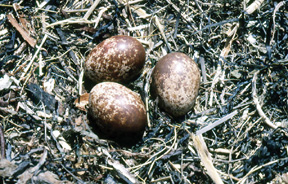The Osprey Saga

by M.C. Koblos
Week 5: Making Eggs
There has been some really heavy sexual activity this week. Seems like an awful lot of effort being expended to finally produce two or three (at the most) fertilized eggs for incubating. But I guess, as in humans, the fun is in the effort.
  Here along Chesapeake Bay, osprey usually lay their eggs mid-April. Incubation starts with the first egg and takes about five weeks. Thus the hatchlings do not all appear the same day but, rather, over a period of days. Since the first chick starts to be fed immediately, that one will be the strongest of the brood and therefore always the one that will be fed first. Two babies can get by pretty well, but a third will be the runt — the weakest and the last to learn to fly. Or the runt may be shoved from the nest by the other two before it reaches the flight stage. Nature does not pamper the weak. Here along Chesapeake Bay, osprey usually lay their eggs mid-April. Incubation starts with the first egg and takes about five weeks. Thus the hatchlings do not all appear the same day but, rather, over a period of days. Since the first chick starts to be fed immediately, that one will be the strongest of the brood and therefore always the one that will be fed first. Two babies can get by pretty well, but a third will be the runt — the weakest and the last to learn to fly. Or the runt may be shoved from the nest by the other two before it reaches the flight stage. Nature does not pamper the weak.
It takes about eight weeks before the fledglings are ready for flight. But we are a little ahead of ourselves here.
In the meantime, Oliver is dutifully performing his function, occasionally even bringing a fish to Olivia as enticement and tribute. I’m sure it beats a dozen roses.
Olivia has been bothered by young bucks that don’t have mates yet. They come calling, and Oliver, standing guard in Big Willie — the 70-foot willow oak that shades my yard — comes swooping to the rescue like a jet fighter. He chases the intruder away, returning to the nest for a little well-deserved loving before reclaiming his post in the tree.
Young osprey usually stay in their southern wintering area for their first year, returning to their birthplace in their second year to find a mate, or someone else’s mate if she will have them.
I guess infidelity occurs in all species, and divorce as well. Sometimes a female osprey will take a new mate, to replace an old and doddering one.
|
![]()



